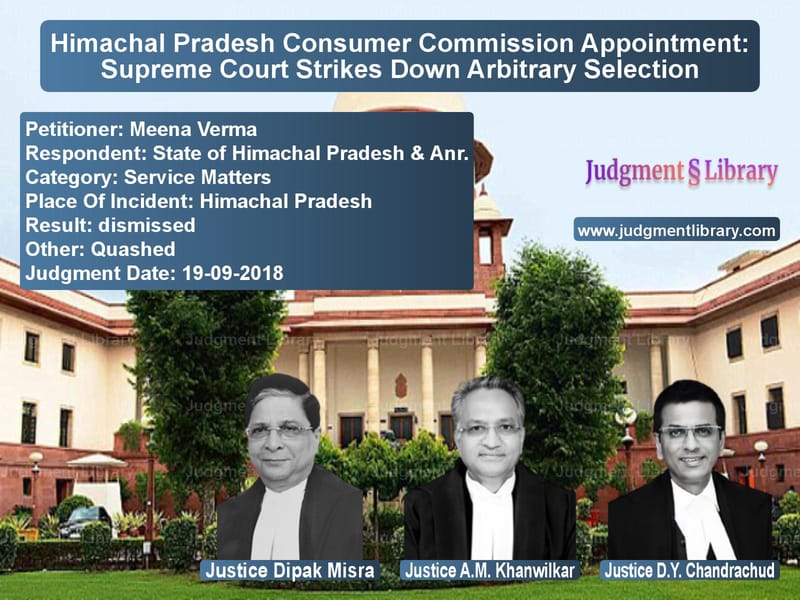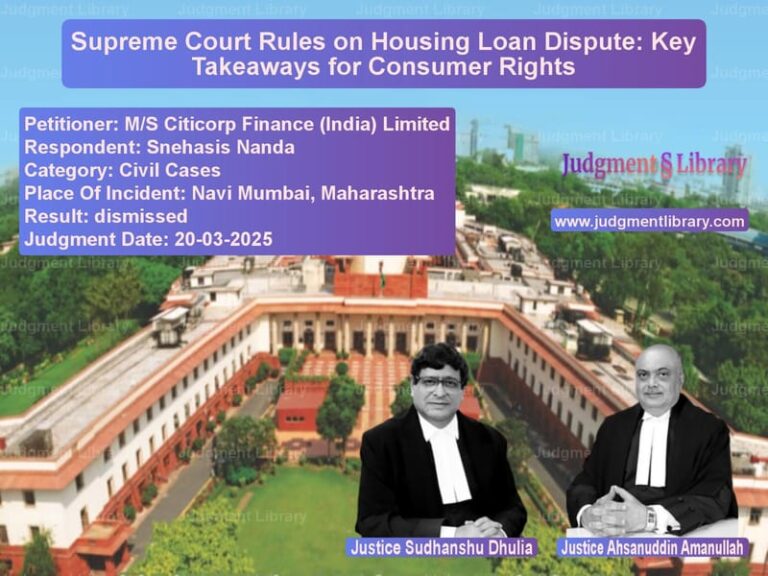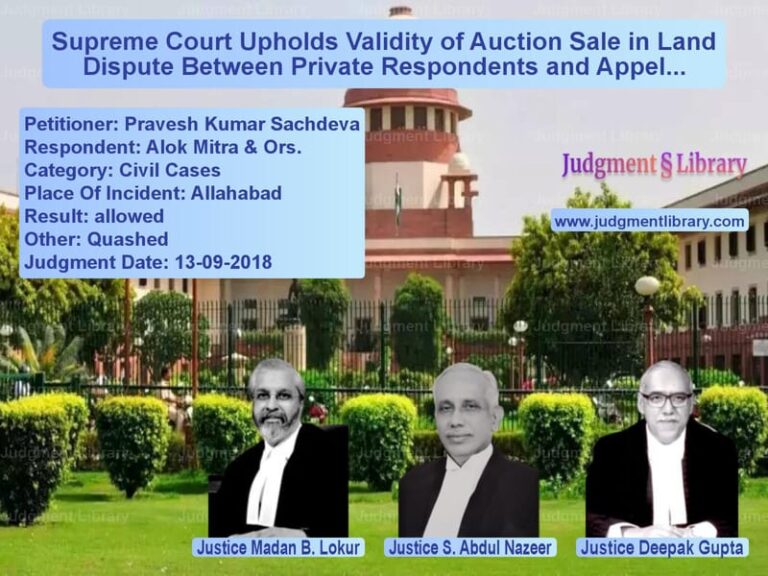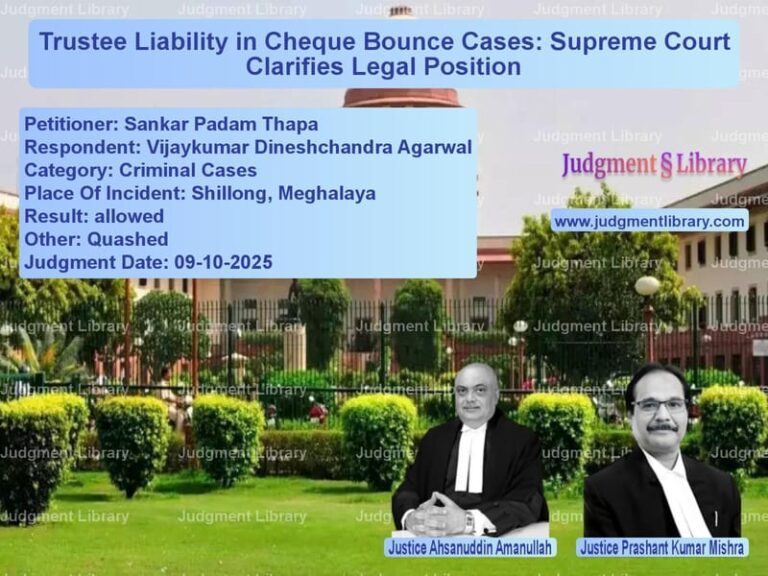Himachal Pradesh Consumer Commission Appointment: Supreme Court Strikes Down Arbitrary Selection
The Supreme Court of India, in the case of Meena Verma vs. State of Himachal Pradesh & Anr., examined the legality of an appointment to the Himachal Pradesh Consumer Disputes Redressal Commission. The Court ruled that the selection of a candidate must follow transparent criteria and cannot be based on arbitrary decisions.
The case highlights important principles concerning merit-based appointments and the role of selection committees in upholding fairness in public appointments.
Background of the Case
The dispute arose when the Himachal Pradesh government appointed Meena Verma as a part-time female member of the State Consumer Disputes Redressal Commission. The appointment was challenged by Sunita Sharma, another candidate for the post, who argued that she was more meritorious but was overlooked.
The key facts of the case were:
- The Himachal Pradesh government advertised the post on 25 April 2016, requiring candidates to have at least ten years of experience in law, commerce, public affairs, or administration.
- A Selection Committee interviewed candidates on 2 July 2016 and ranked them based on their performance.
- The final list ranked Sunita Sharma at No. 2 and Meena Verma at No. 3.
- The government appointed Meena Verma, bypassing Sunita Sharma despite both having the same marks.
- The reason cited was that Meena Verma had more public experience, but no formal explanation was provided.
Feeling aggrieved, Sunita Sharma challenged the decision before the Himachal Pradesh High Court.
Arguments of the Petitioner (Sunita Sharma)
Sunita Sharma argued that:
- The selection list was based on merit and ranking, and she was ranked higher.
- The government’s decision to appoint Meena Verma was arbitrary and discriminatory.
- The claim that Meena Verma had better public experience was unfounded and lacked evidence.
- The appointment process should be guided by rules and principles of fairness.
Arguments of the Respondents (Himachal Pradesh Government & Meena Verma)
The government and the appointed candidate defended the decision, stating:
- The appointment was within the discretion of the government.
- The selection list only provided a panel of eligible candidates, not a mandatory ranking.
- The government considered public experience as a relevant factor in selection.
- The decision was taken after careful consideration and was not arbitrary.
High Court’s Decision
The Himachal Pradesh High Court ruled in favor of Sunita Sharma, holding that:
- The government’s justification was vague and unsubstantiated.
- Appointments must be based on objective criteria and transparency.
- Seniority and experience should have been considered fairly.
- The decision to appoint Meena Verma violated Articles 14 and 16 of the Constitution (right to equality in public employment).
The High Court quashed Meena Verma’s appointment and directed the government to reconsider Sunita Sharma’s case.
Supreme Court’s Observations
The Supreme Court upheld the High Court’s ruling, making the following key observations:
- “The selection committee prepared the panel on merit, and the government had no authority to arbitrarily override it.”
- “If two candidates have the same marks, preference should be given based on established criteria, not subjective assessments.”
- “The government failed to provide a clear rationale for why Meena Verma was chosen over Sunita Sharma.”
- “Appointments to public bodies must be made in a fair and transparent manner, ensuring equal opportunity for all candidates.”
Final Judgment
The Supreme Court dismissed the appeal and ruled that:
- The appointment of Meena Verma was quashed.
- The Himachal Pradesh government must reconsider the appointment based on merit.
- The decision reaffirmed the principles of transparency and fairness in public appointments.
Impact of the Judgment
This ruling has significant implications for public employment and selection processes. Key takeaways include:
- Governments must follow objective and transparent criteria in appointments.
- Selection committees’ recommendations cannot be overridden without valid reasons.
- Arbitrary appointments violate constitutional protections against discrimination.
- The ruling strengthens merit-based selection for public offices.
By reinforcing the need for fairness in appointments, the Supreme Court ensured that government bodies uphold transparency and accountability in recruitment processes.
Petitioner Name: Meena Verma.Respondent Name: State of Himachal Pradesh & Anr..Judgment By: Justice Dipak Misra, Justice A.M. Khanwilkar, Justice D.Y. Chandrachud.Place Of Incident: Himachal Pradesh.Judgment Date: 19-09-2018.
Don’t miss out on the full details! Download the complete judgment in PDF format below and gain valuable insights instantly!
Download Judgment: Meena Verma vs State of Himachal Pr Supreme Court of India Judgment Dated 19-09-2018.pdf
Direct Downlaod Judgment: Direct downlaod this Judgment
See all petitions in Recruitment Policies
See all petitions in Public Sector Employees
See all petitions in Promotion Cases
See all petitions in Judgment by Dipak Misra
See all petitions in Judgment by A M Khanwilkar
See all petitions in Judgment by Dhananjaya Y Chandrachud
See all petitions in dismissed
See all petitions in Quashed
See all petitions in supreme court of India judgments September 2018
See all petitions in 2018 judgments
See all posts in Service Matters Category
See all allowed petitions in Service Matters Category
See all Dismissed petitions in Service Matters Category
See all partially allowed petitions in Service Matters Category







